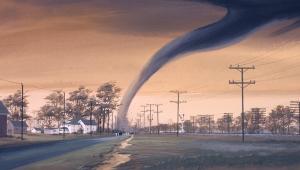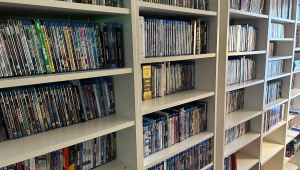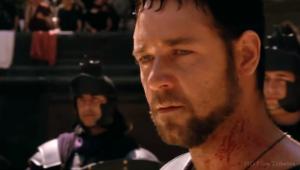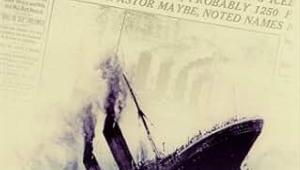Dune, at Last

But what exactly is the story of Dune? It's thousands of years in the future and mankind has conquered the cosmos, occupying hundreds or thousands of worlds. We've learned to fold space, enabling travel of unimaginable distances in the time it takes us to fly from New York to LA today. But to do so it requires the rare drug Melange, or as it is more commonly called, "Spice." It's the Spice that, among its other "benefits," enables such travel. The result is a vast galactic empire, with an emperor at its head and feuding Houses that husband one or more individual planets. But the Spice is available only on the planet Arrakis, with the House in power there able to accrue vast wealth.
But Arrakis has little to offer apart from the Spice; it's a desert wasteland populated by the native Fremen and otherwise sparse local fauna, the latter dominated by the immense and dangerous sandworms. Arrakis had been run for generations by the predatory House Harkonnen, but the emperor recently displaced them (for nefarious reasons of his own) with the more benevolent house Atreides. Paul, the young son and heir of Duke Leto Atreides, becomes the main character as the plot thickens.
The book is 700 pages long, so there's a little more to the story than any summary can provide. There's also more than can be squeezed into a 2-hour movie. Director David Lynch learned that the hard way in his 1984 version, reviled by audiences and critics alike (though it does have its fans and was recently released on 4K UltraHD Blu-ray).
A 2001 miniseries, made for the Sci-Fi channel before it became SYFY (sigh!), was the last attempt before now to dramatize the story. It was followed up in 2003 by the miniseries Children of Dune, an extension of the saga adapted from two subsequent novels written by Herbert to continue the story. There were even more Dune books later, written either by Herbert or his son.
Both Sci-Fi miniseries were limited by their budgets and early CGI special effects, but were nevertheless rewardingly epic versions of the story. Both are available via streaming or disc. I highly recommend both of them, particularly Children of Dune, the best filmed version of a Dune saga to date, present company included.
After over a year's delay due to Covid, the highly anticipated new film of Dune, directed by Denis Villeneuve (Blade Runner 2049, Arrival) was released in the U.S. this past Friday both in theaters and on-demand. I saw it today (Monday) in my local Dolby Cinema theater, my first visit to that theater (or any theater) in roughly two years. Early on in our Covid madness I feared this theater wouldn't survive. But so far it has.
The crowd at my weekday afternoon visit was small. An on-line look at the crowds over the weekend weren't much larger. But the total box office worldwide, to date (the film opened a week or two earlier in other markets before it hit U.S. theaters) was apparently goodover 200 million (as far as I can tell, this is for theaters only, with the streaming take not included).
That will be important to the future of this film, because what we have here is only Part 1. That's the main weakness of Part 1; it's not a standalone story. The film just ends abruptly, leaving you wondering where the rest of it is. I knew that going in, but wonder how much of the audience didn't.
But as long as it lasts, Part 1 is spectacularly well produced. Villeneuve certainly knows how to grab viewers' eyeballs. The art design here is stark and far less colorful than in that Sci-Fi mini-series, particularly the palace in Arrakis. This grimness certainly fits the mood of the story and the monochromatic environment of Arrakis, but brief scenes in other worlds (particularly in the Atreides home planet of Caladan, with its lush vegetation and clear rivers and oceans) don't offer any real counterpoint.
This is where I confess that I've never navigated the book, so I'm not the best judge as to how well this film (or others) follows the source material. As presented here It may prove a bit confusing to the viewer unfamiliar with the story, particularly as more clearly presented in the Sci-Fi mini-series. There are details in the latter glossed over here, simply because the mini-series had time to flesh them out. The span between the arrival of the Atreides on Arrakis and an important battle scene seemed more rushed in my mind than it actually was in film-time because it lacked several useful character building moments. For example, in the mini-series, when the Atreides first arrive in Arrakis' capital city, Lady Jessica (Paul's mother) immediately makes a small but telling change in the distribution of water in Arrakis city, a commodity more valuable than gold in the planet's harsh and parched climate.
I was disappointed in the visual presentation in my Dolby Cinema theater. With rare exceptions the film was quite dark throughout, which was not the case in the trailers of the film I've seen at home on YouTube. Nevertheless, I encourage you to watch the film on the biggest screen possible. It will likely look brighter and crisper on your home theater, but absent the challenge of a 30-foot wide (or wider) theater screen, it won't be as dramatic and immersive at home.
That goes even more so for the audio, which was rocking the theater. A good deal of this was thanks to Hans Zimmer's exceptional score making frequent use of pounding drums. It's not in any way a melodic score such as John Williams might have composed, but fits the film perfectly and adds immensely to the film's impact. The sound effects themselves were also stunning. When you watch the film at home your subwoofers will demand a raise.
Despite a few action scenes, Dune is a deliberately paced film, not a Marvel-like festival of mayhem beats thrown in every few minutes to keep the audience pumped up. That might be its main weakness for today's audiences. But despite the film's often deliberate pacing of individual scenes, Villeneuve's Dune kept me so involved it hardly seemed that 2.5 hours had passed as I left the theater.
But, you ask, did I like it? Yes, very much. It's no Lord of the Rings Trilogy or Laurence of Arabia on my list of the greatest epic films of all time, but I'll definitely add it to my 4K collection when it arrives on disc and I look forward to seeing Part 2.





























































